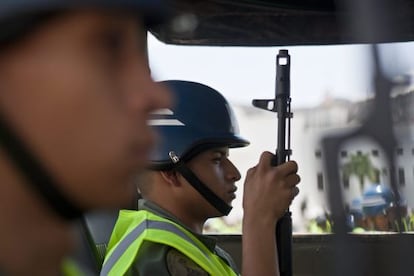Venezuelan troops take to Caracas streets to battle crime
Human rights groups fear abuses by military not trained to deal with civil protection

Venezuelan President Nicolás Maduro called out 3,000 troops to the streets of Caracas on Tuesday in a renewed effort to crack down on rampant crime in one of the world’s most dangerous cities.
It is the 15th operation undertaken by the Bolivarian Revolution — the Socialist government movement forged by the late President Hugo Chávez — to battle crime and delinquency in the capital, which has become a major concern among Venezuelans.
According to figures from the country’s Interior Ministry, there were 16,000 murders throughout Venezuela last year. Caracas ranks among the top three most dangerous cities in the world, according to several international organizations. But some NGOs believe that the country’s homicide rate is much higher than official figures suggest.
So far in May, 186 murders had been registered in Caracas, and, just last weekend, 41 bodies were piled up at the city’s Bello Monte Morgue.
These figures, more akin to the level of fatalities in a civil war, have for a long time caused panic among Venezuelans who fear venturing out onto the streets at night. At first, the past Chávez government had blamed the “sensationalist press” for exaggerating the situation.
But last year, when Chávez, who died on March 5, was running for his fourth and last term, he publicly acknowledged that the crime issue could no longer be ignored. In June, he re-launched a massive social program — first introduced in 2004 — under the title of “At all costs, Venezuela,” which included attempts to restructure the country’s notoriously overcrowded prison system, giving more power to municipalities in local security issues, and providing help to crime victims.
This is another army. These are the armed forces of Hugo Chávez” Nicolás Maduro
But now Maduro has replaced that strategy by taking a stronger hand. As part of a pilot program, the 3,000 soldiers will control some 500 checkpoints across the city, mostly in the Caracas suburbs of Sucre and Baruta, which are governed by the opposition.
"Our armed forces are taking the streets to protect the people," Maduro said in a live broadcast speech. “I call on you to serve your country."
But some human rights groups fear this “occupational force” isn’t adequately trained to deal with civil security situations, and that abuses may occur.
Even Patricia Villegas, a Colombian journalist who is the director of the state-financed Telesur regional network, asked Maduro in an interview last Friday — as he marked three weeks in office - about the military’s role in providing security.
“This is another army,” Maduro said. “These are the armed forces of Hugo Chávez.”
This change in security policy is said to be the idea of retired General Miguel Rodríguez Torres, who was appointed recently as interior minister after serving under Chávez as head of the military intelligence agency. According to those with knowledge of the plan, Rodríguez Torres wants to take away police jurisdiction from local governments.
Maduro and his nearly one-month-old government is facing continuous pressure from the opposition and its leader, Henrique Capriles, who have been demanding a recount of the April 14 vote which they claim was marred by electoral irregularities and violations. Maduro, Chávez’s handpicked successor, won by 1.89 percent.
The new government is also facing threats of social unrest stemming from food and energy shortages.
Tu suscripción se está usando en otro dispositivo
¿Quieres añadir otro usuario a tu suscripción?
Si continúas leyendo en este dispositivo, no se podrá leer en el otro.
FlechaTu suscripción se está usando en otro dispositivo y solo puedes acceder a EL PAÍS desde un dispositivo a la vez.
Si quieres compartir tu cuenta, cambia tu suscripción a la modalidad Premium, así podrás añadir otro usuario. Cada uno accederá con su propia cuenta de email, lo que os permitirá personalizar vuestra experiencia en EL PAÍS.
¿Tienes una suscripción de empresa? Accede aquí para contratar más cuentas.
En el caso de no saber quién está usando tu cuenta, te recomendamos cambiar tu contraseña aquí.
Si decides continuar compartiendo tu cuenta, este mensaje se mostrará en tu dispositivo y en el de la otra persona que está usando tu cuenta de forma indefinida, afectando a tu experiencia de lectura. Puedes consultar aquí los términos y condiciones de la suscripción digital.








































